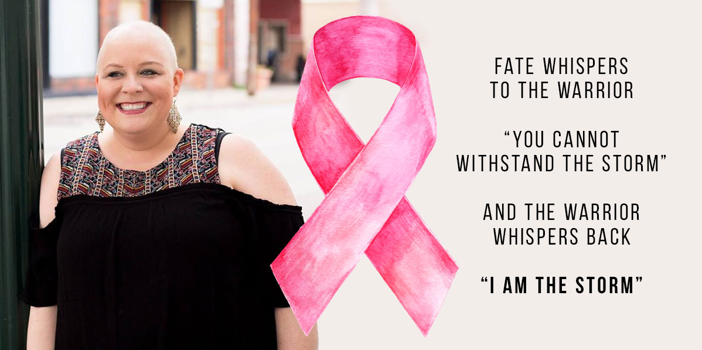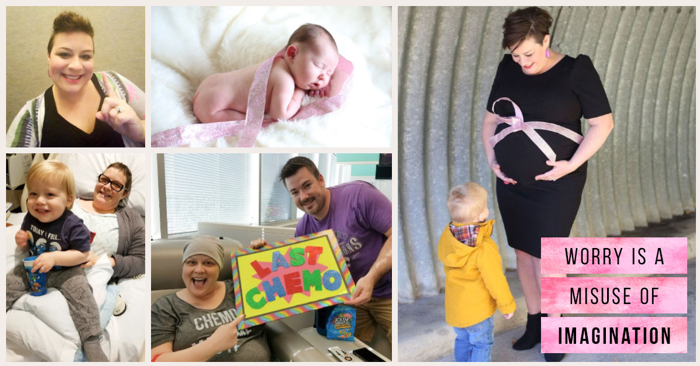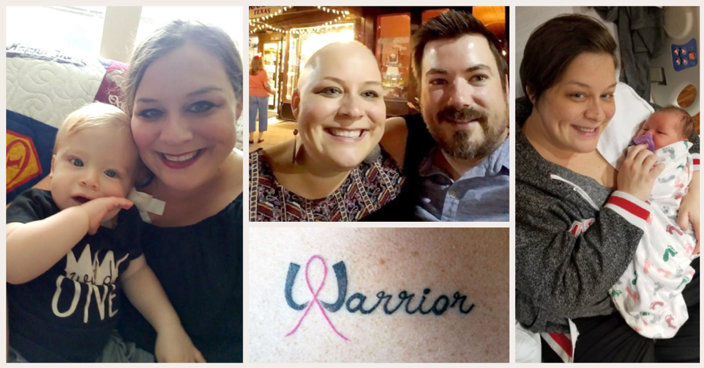Shared by: http://neorablog.com/neora-people/the-story-of-a-survivor/

Valerie Schmitt, Neora Sales Training Senior Manager, offers inspiration, information and hope as she shares the personal story of her journey as a breast cancer survivor.
Normal Life
I was just going on with everyday life – enjoying starting a new job and excited for my son to start daycare. Little man was 10 months old when I started my position at Neora, so I figured starting the job would be a good time to stop breastfeeding.
Weaning him off was painful, and I kept feeling a pain in my left breast in particular, but I assumed it was a clogged duct or my milk drying up. After my milk had dried up a week or so later, I realized the pain was radiating from a large lump in my left breast. I had never noticed it before, but between pregnancy and breast feeding, it was hard to tell what was normal with my body and what wasn’t. I made an appointment with my OB to get it checked out.
During that first visit, my doctor figured it was probably a clogged milk duct. I had zero history of breast cancer in my family – zero history of cancer at all – and was only 34. Why would there be any reason to assume otherwise? She sent me to a breast specialist for an ultrasound to be certain.
A week or so later, I found myself in the breast specialist’s office getting an ultrasound done. My husband was there holding my hand. The doctor looked at the image and then called another doctor into the room. A few minutes later they told me I needed to go across the hall to have a mammogram done. I didn’t know much, but I knew that when doctors move that fast or ask for a mammogram on someone under 40, it can’t be good.
I went across the hall to get my mammogram and the tech shook her head and told me I might need to prepare myself. I went back across the hall for results and they told me I would need a biopsy later that week.
The News
On June 15th, I went back to the breast specialist to get the results from the biopsy. It was breast cancer. But not the hormone positive breast cancer that even the doctors had assumed (due to my pregnancy) but a breast cancer called triple negative.
Triple negative cancer does not respond to hormone therapy and is seen as an aggressive cancer with higher chances of relapse. The doctor ordered DNA testing to see if I carried a genetic risk for it, since I was so young with no family history of cancer, and he told us that due to the aggressive form of cancer I had, and the size of my tumor, we needed to move fast to make sure it hadn’t spread. It was best to do chemotherapy first to stop the cancer from spreading and then follow chemo with surgery.
The next week and a half were filled with appointments, ultrasounds, an MRI, an EKG on my heart and a surgery to have my port placed. I didn’t have time to consider our future and the possibility of having more children. I was scared and wanted the cancer gone, and all the doctors told me that due to the aggressive form of my cancer, I needed to act fast.
Before the end of the month and before my son’s first birthday, I did my first round of eight chemotherapy treatments. I was told I would lose my hair and be sick, and I’d likely be unable to be around my son a lot, due to germs. I remember feeling sad and angry but, most of all, scared. I was going to fight for my life and do everything I could to get this disease out of me.
Another cancer warrior gave me the best advice that week: “Your job now is to do everything possible to survive and be healthy to watch your son grow up. You do everything you have to do to make that happen.” So, I focused forward, and I did.

Treatment
I did eight rounds of chemotherapy from late June until mid-October. I lost my hair. I was constantly nauseous. Food didn’t taste the same. The side effects to my body were horrible, and it was the hardest time of my life emotionally.
But I was surrounded by love and support. A cousin came to live with us to care for my son, because he couldn’t be in daycare (due to the germs). A friend or family member came with me every other week to my chemo infusions. They brought me games and coloring books, read me stories and made me laugh.
People from every stage of my life sent food. I received care packages from people I hadn’t spoken to in years – one even coming from a former coworker currently living in Ireland. And on the off weeks, I put on a badass, fun wig and I went to work. I acted like things were normal. And as crazy as that sounds, I think it helped – me having that consistency. It was almost like living two separate lives, but it worked for me.
Chemotherapy was showing signs of working and shrinking the tumor. The physical battle was hard. After round 3 I begged my doctors to stop, but they told me I had to soldier on, so I did.
What got me through those dark days of wanting to throw in the towel, or the moments when I felt lost without my hair or was having a hot flash, was my awesome support system. I called my friends and vented or cried or laughed. I did meditation. I hugged my son. I went to therapy. I cuddled my puppies.
There is an image that I looked at before every round of chemo: “Fate whispers to the warrior, ‘You cannot withstand the storm.’ And the warrior whispers back, ‘I am the storm.’ ” I just kept telling myself to be the storm.
The Decision
Near the end of my chemotherapy, I was asked to decide between a lumpectomy (where they just remove what is left of the tumor and some area around it) or a mastectomy (where they take your breast(s)). If I did a lumpectomy, the doctors recommended radiation due to my cancer being triple negative. If I did a mastectomy, the need for radiation would depend on the results of my lymph node biopsy to see if cancer had spread to my lymph nodes.
I gave this a lot of thought. I met with a radiologist. We discussed the risks of radiation and how it could possibly affect my heart, lungs and rib cage. Ultimately the decision came down to my peace of mind. I just kept thinking about my goal – to live as long as possible to watch my son grow up. And I decided I was willing to do whatever drastic means necessary to lessen my risk of reoccurrence. So, I chose the double mastectomy.
The Big Surgery
I had my double mastectomy in November of 2017 the week prior to Thanksgiving. Thankfully family came down to help me recover and care for my little guy. Friends came through and brought all the dishes necessary for us to have a Thanksgiving dinner without me lifting a finger.
The day before Thanksgiving I received a phone call with the best news I had ever received: “100% complete pathological response.” The cancer was gone. Results from the biopsy of my breast tissue and lymph nodes from the mastectomy had only shown scar tissue. Chemo had killed ALL the cancer in my body.
So, as for treatment, I was done. No radiation and no long-term pills needed. Now I just had to do reconstruction and then begin the process of rebuilding my “normal” life. I was elated. I took the time over the holidays to spend time with family and friends and soak in all the joy that life had to offer. I had beaten it.
Then in February I did my first BIG reconstruction – something called a DIEP Flap. To make a complicated surgery sound simple, they gave me a tummy tuck and used that fat to recreate my breasts. Recovery was long and painful. I had drains and could barely move my abdomen to straighten my body or stand up to walk. I couldn’t lift my son for 8 weeks.
Thankfully my cousin agreed to move back in with us during that time to be my caretaker. Again, family and friends stepped in to send food and help in any way they could. I got through it.
After my eight-week recovery and return to work, I decided to close the book on what cancer had taken from me. I needed to know if I would ever be able to have a child again. We went to my OB, who sent me to a fertility specialist. The fertility doctor explained that they would do bloodwork to “guestimate” the amount of eggs I had left and the viability that they would be good (which would be unlikely due to the chemo).
A few weeks later, the results came in – my AMH level (which should have been between a 1 and 3) was .04 – too low to do fertility treatment with the tiniest chance of me ever having a baby naturally again. I was devastated. It felt like another hit to my womanhood and just another thing on the long list of what cancer had taken from me. I reached out to my plastic surgeon and told him that we should move forward with the final reconstruction to fix issues from my previous surgery. I wanted this chapter of my life closed for good.

The Miracle After the Storm
I had my last reconstruction surgery in June of 2018. After the surgery I felt sick constantly, I was weak and I just couldn’t get back to my normal self. I went to see all my doctors and they were at a loss as to what was causing it. Then, by suggestion of my friends, I took a pregnancy test. By some insane miracle, I was pregnant.
I didn’t believe the results. I had only had one period since stopping chemo, which is common since chemo has been known to send women into menopause. I had been told there was no way I could get pregnant. I had declined the pregnancy test before my final surgery!
I obviously assumed the worst – that even if I had been pregnant prior to surgery, that the surgery or meds that I had taken after had obviously done something to the baby. I contacted my OB and told them I needed an ultrasound, but I assumed I was having, or had already had, a miscarriage.
I went into the doctor’s appointment scared, sad and prepared to hear the worst. The ultrasound started, and there on the screen was a healthy baby – moving and practically waving at us. I seriously screamed. The doctor told me I was 10½ weeks pregnant.
My OB called her staff in and everyone stood there in shock. No one had expected this news that day. I was crying, the friend who came with me to the appointment was crying, my doctor was crying … it was truly a miracle. A miracle that I had gotten pregnant in the first place, and a miracle that the pregnancy had not been affected by my recent surgery.
That same day they told me they would send out bloodwork to determine the gender of my baby. Imagine the shock of finding out that not only are you pregnant after hearing that the pregnancy door was closed, but you’re far enough along to know the gender! It was mind-blowing.
The next six months of pregnancy were spent seeing various doctors to confirm that the baby and I were completely healthy (which we were) and getting to experience each doctor’s reaction as they were either baffled or stunned to tears by my story. My team of doctors started referring to me as a “medical unicorn.” It was rare and shocking that I had such an aggressive cancer that came out of nowhere with no history or reason in the first place, but equally rare and shocking that my year and a half-long cancer journey was ending with a miracle baby.
Our miracle baby, Adelaide Hope, was born in January.
Looking Forward
There are so many things that my journey has taught me. I don’t think I can put into words the emotional roller coaster that you go through. Having to stare death in the face, wondering if you will be alive to watch your child grow up, being asked to prepare your will … it was more than I could have fathomed going through at the ripe old age of 34.
Losing your hair and your breasts can make you feel like you are no longer a woman – like you will never be beautiful again. I remember one time being at the pharmacy to pick up my meds and the clerk called me “sir.” I cried for hours. But I can tell you the strength you gain from those dark moments – the ability to no longer define yourself by something so trivial as your hair – is a strength you’ll carry through life.
I see beauty in WHO people are now. In how they treat others and how they show up when things are hard versus just taking things at face value. The journey forces you to put things into perspective. To learn to prioritize your life and yourself and no longer get hung up on the trivial things that used to keep you up at night. There is a reason they call us warriors – because the battle is so much bigger than just a disease and takes so much more than just going through treatments. It takes an emotional strength and growth that can’t be put into words.
Educate Yourself
This is my story, but understand that cancer is something that will likely affect you or a loved one in your lifetime. Learn what breast cancer looks like. Media awareness campaigns are just that – to make you aware – but it’s up to you to dig deeper and learn the details.
Perform regular self-exams and, if you are over 40, get a mammogram annually. Breast cancer is a serious disease and survivors go through the same treatment (and sometimes more treatment) than other cancers. Metastatic breast cancer, when a breast cancer has spread beyond the breast and nearby lymph nodes into other organs in the body, has no cure. Thirty percent of women who have had early stage breast cancer will eventually develop metastatic breast cancer. Patients can and do have their breast cancer metastasize 30 years or more after treatment. Fewer than one-in-four women diagnosed with metastatic breast cancer live beyond five years.
You can learn more from the National Breast Cancer Foundation, Inc. at https://www.nationalbreastcancer.org.
How You Can Help
If you have the means to donate to one of the breast cancer charities, please do. Look for organizations that support research to find a cure for metastatic breast cancer. Not every foundation is the same, and some devote more of their funds to research than others. You can see the ratings of thousands of registered charities at Charity Navigator, an independent nonprofit organization.
Find ways to help someone going through treatment – even if it’s something as simple as helping with the housecleaning, sending food or sitting by their side and making them laugh. Educate yourself on how to be compassionate through this process.
And to my fellow warriors out there – you are the storm. Keep fighting and being the badasses that I know you are.
VALERIE’S BREAST CANCER RESOURCES
Breast Cancer Research Foundation: https://www.bcrf.org/
National Breast Cancer Foundation: https://www.nationalbreastcancer.org/#
METAvivor MBC research and support: https://www.metavivor.org/
You may also reach out to Valerie directly on Facebook or at vschmitt@neora.com
The post The Story of a Survivor appeared first on Best Anti Aging Eye Cream.

No comments:
Post a Comment